Cultural Graphology
Writing after Derrida
Juliet Fleming
The University of Chicago Press
Chicago and London
JULIET FLEMING is associate professor of English and director of the MA program in English at New York University. She is the author of Graffiti and the Writing Arts of Early Modern England.
The University of Chicago Press, Chicago 60637
The University of Chicago Press, Ltd., London
2016 by The University of Chicago
All rights reserved. Published 2016.
Printed in the United States of America
25 24 23 22 21 20 19 18 17 16 1 2 3 4 5
ISBN-13: 978-0-226-39042-0 (cloth)
ISBN-13: 978-0-226-39056-7 (e-book)
DOI: 10.7208/chicago/9780226390567.001.0001
Publication costs were supported by the Department of English at New York University, through the generosity of the Abraham and Rebecca Stein Faculty Publication Fund.
Library of Congress Cataloging-in-Publication Data
Names: Fleming, Juliet, author.
Title: Cultural graphology : writing after Derrida / Juliet Fleming.
Description: Chicago ; London : The University of Chicago Press, 2016. | Includes bibliographical references and index.
Identifiers: LCCN 2016001194 | ISBN 9780226390420 (cloth : alk. paper) | ISBN 9780226390567 (e-book)
Subjects: LCSH: Derrida, Jacques. | LiteratureHistory and criticism. | WritingSocial aspects.
Classification: LCC B 2430. D F55 2016 | DDC 194dc23 LC record available at http://lccn.loc.gov/2016001194
 This paper meets the requirements of ANSI / NISO Z39.48-1992 (Permanence of Paper).
This paper meets the requirements of ANSI / NISO Z39.48-1992 (Permanence of Paper).
Contents
I am grateful to the students in Cambridge and New York who lent their youthful energies to reading Derrida with me and to the English translators whose work made that possible. John Forrester, Mary Jacobus, Sarah Kay, and other members of the Cambridge Psychoanalytic Reading Group offered stimulating conversation as I started work on this project, and the department of English at NYU, and the wider community of scholars in New York City and New Haven, provided a congenial environment in which to finish it. Jason Scott-Warren and Adam Smyth have been generous friends, interlocutors, and guides to the archive. Two anonymous reports (in one of which I recognized the brilliant hand of Tom Conley) and the careful scrutiny of Gary Tomlinson and Margreta de Grazia allowed me to significantly improve the final manuscript. I am indebted to all four readers for their transformative suggestions and corrections. Margreta has for many years cast her protective brilliance over the slow growth of this book. My deepest thanks are to her; to my son Raymond Fleming, who followed his mother up the steep paths of his childhood without flagging or complaint, until it became my turn to follow him; and to my dearest husband and partner in thought, Gary Tomlinson, to whom this book is dedicated.
Works by Derrida
AC | Aphorism Countertime. Translated by Nicholas Royle. In Acts of Literature, edited by Derek Attridge, 41433. London and New York: Routledge, 1992. |
AF | Archive Fever: A Freudian Impression. Translated by Eric Prenowitz. Chicago: University of Chicago Press, 1996. |
C | Circumfession. Translated by Geoffrey Bennington. In Jacques Derrida (in collaboration with Geoffrey Bennington). Chicago: University of Chicago Press, 1993. |
CC | Che cos la poesia? Translated by Peggy Kamuf. In A Derrida Reader: Between the Blinds, edited by Peggy Kamuf, 22137. London: Harvester, 1991. |
D | Dissemination. Translated by Barbara Johnson. Chicago: University of Chicago Press, 1981. |
DN | Deconstruction in a Nutshell: A Conversation with Jacques Derrida. Edited by John C. Caputo. New York: Fordham University Press, 1995. |
E | The Ear of the Other: Otobiography, Transference, Translation. Edited by Christie McDonald and translated by Peggy Kamuf. Lincoln: University of Nebraska Press, 1988. |
ED | Lcriture et la diffrence. Paris, ditions du Seuil, 1967. |
F | Fors: The Anglish Words of Nicolas Abrahms and Maria Torok. Translated by Barbara Johnson. Foreword to The Wolf Mans Magic Word, by Nicholas Abraham and Maria Torok, xixlviii. Minneapolis: University of Minnesota Press. |
G | Glas. Translated by John P. Leavey Jr. and Richard Rand. Lincoln: University of Nebraska Press, 1990. |
GD | The Gift of Death. Translated by David Wills. Chicago: University of Chicago Press, 1995. |
Grammatology | Of Grammatology. Translated by Gayatri Spivak. Baltimore: Johns Hopkins University Press, 1976. |
HE | Heideggers Ear: Philopolemology (Geschlecht IV). Translated by John Leavey Jr. In Reading Heidegger: Commemorations, edited by John Sallis, 163218. Bloomington: Indiana University Press, 1992. |
ITS | I Have a Taste for the Secret. In A Taste for the Secret, by Jacques Derrida and Maurizio Ferraris. Translated by Giacomo Donis and edited by Giacomo Donis and David Webb. Cambridge: Polity Press, 2001. |
M | Mallarm. Translated by Christine Roulston. In Acts of Literature, edited by Derek Attridge, 11025. London: Routledge, 1992. |
MC | Mes Chances: A Rendezvous with Some Epicurean Stereophonies. Translated by Irene Harvey and Avital Ronnell. In Taking Chances:Derrida, Psychoanalysis and Literature, edited by H. Smith and W. Kerrigan, 132. Baltimore: Johns Hopkins University Press, 1984. |
MP | Margins of Philosophy. Translated by Alan Bass. Chicago: University of Chicago Press, 1982. |
MS | Maddening the Subjectile. Translated by Mary Ann Caws. Yale French Studies 84 (1984): 15471. |
OT | On TouchingJean-Luc Nancy. Translated by Christine Irizarry. Stanford: Stanford University Press, 2005. |
PC | The Postcard. Translated by Alan Bass. Chicago: University of Chicago Press, 1987. |
PM | Paper Machine. Translated by Rachel Bowlby. Stanford, CA: Stanford University Press, 2005. |
Po | Positions. Translated by Alan Bass. Chicago: University of Chicago Press, 1981. |
Pt | Points... Interviews 19741994. Edited by Elisabeth Weber and translated by Peggy Kamuf et al. Stanford, CA: Stanford University Press, 1995. |
PT | The Purveyor of Truth. Translated by Willis Domingo, James Hubert, Moshe Ron, and M.R. L. Yale French Studies 52 (1975): 31113. |
PTT | Punctuations: The Time of a Thesis. Translated by Kathleen McLaughlin. In Philosophy in France Today, edited by A. Montefiore, 3450. Cambridge: Cambridge University Press, 1983. |

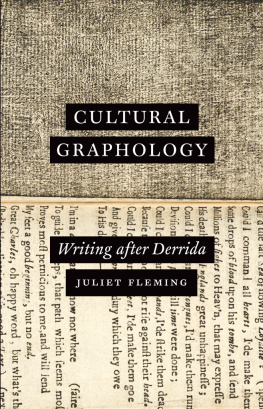


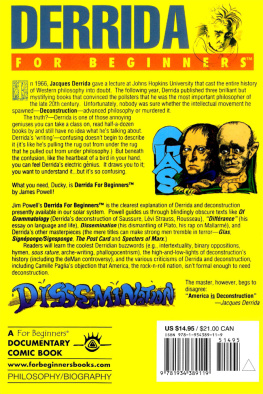

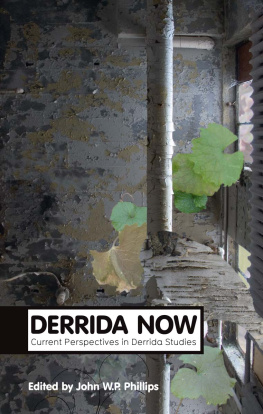



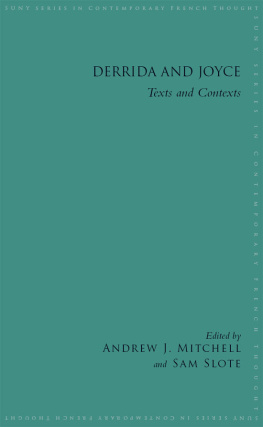
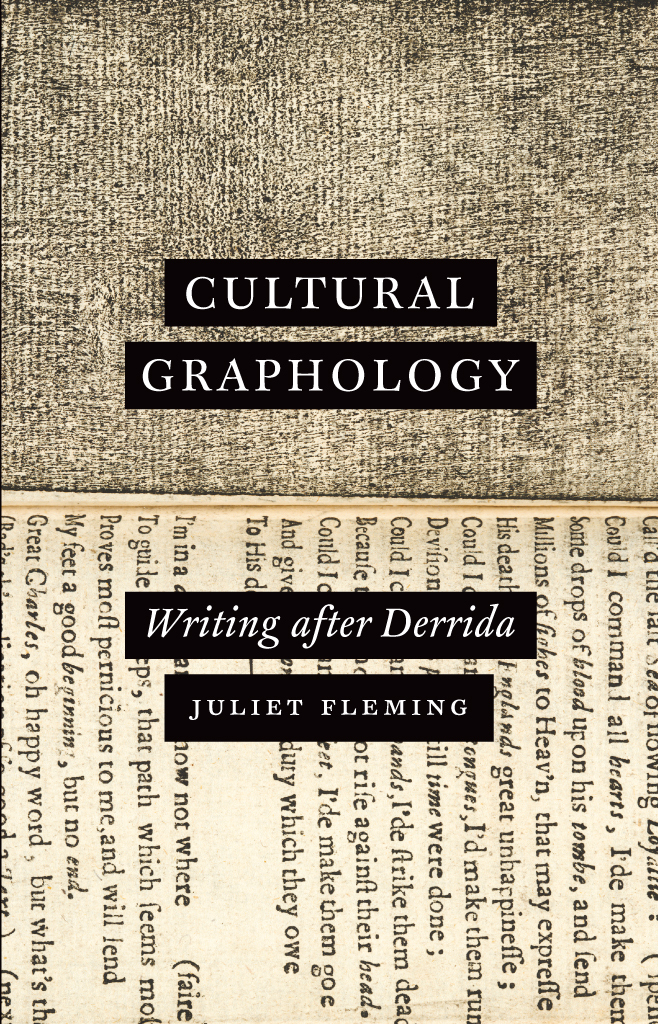
 This paper meets the requirements of ANSI / NISO Z39.48-1992 (Permanence of Paper).
This paper meets the requirements of ANSI / NISO Z39.48-1992 (Permanence of Paper).